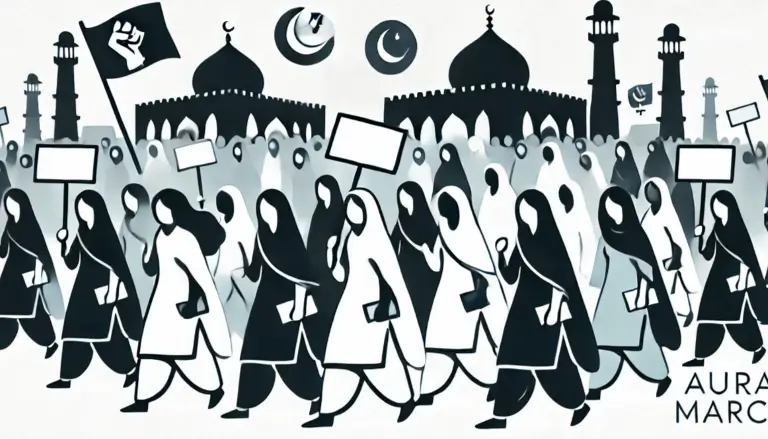“The future depends entirely on what each of us does every day; a movement is only people moving.” Gloria Steinem’s words resonate deeply in the Pakistani context, where the struggle for gender equality continues to evolve against the backdrop of our rich cultural tapestry and complex social dynamics.
In Pakistan, the discourse around gender equality and feminism takes on unique dimensions, interweaving with our religious values and cultural traditions and rapidly modernizing society. From the bustling streets of Karachi to the remote villages of Khyber Pakhtunkhwa, Pakistani women’s experiences reflect both progress and persistent challenges.
The future depends entirely on what each of us does every day; a movement is only people moving.
Gloria Steinem
Our journey began with remarkable women like Fatima Jinnah, who stood alongside the Quaid during the independence movement, demonstrating that Pakistani women could be leaders and changemakers. Today, this legacy continues through powerful voices like Malala Yousafzai, whose courage in advocating for girls’ education has inspired millions globally.
“We all are born equal—equally helpless and equally indebted to others for whatever our survival turns out to be worth.” This universal truth takes on special significance in Pakistani society, where gender roles have traditionally been strictly defined. Yet, we see change happening. In urban centers, women are increasingly visible in previously male-dominated fields—from corporate boardrooms to cricket fields. However, the reality in rural areas often presents a stark contrast.
The words of feminist activist Kamla Bhasin, “Women are not objects; they are subjects. They are not things; they are people,” particularly resonate in our context. In Pakistan, the movement for gender equality faces unique challenges. The gender pay gap persists, with women earning significantly less than men for equal work. Access to education remains uneven, with literacy rates showing marked gender disparities, especially in rural areas. Cultural practices like watta satta (exchange marriages) and honor-related issues continue to affect women’s autonomy.
We all are born equal—equally helpless and equally indebted to others for whatever our survival turns out to be worth.
The evolution of feminism in Pakistan has been distinct from Western waves. Our first generation of feminists, including poet Kishwar Naheed and activist Asma Jahangir, fought against discriminatory laws and for basic rights. The Women’s Action Forum’s resistance during the Zia era marked a crucial phase in Pakistani feminism. Today’s Pakistani feminists address issues ranging from domestic violence to workplace harassment while navigating the delicate balance between cultural values and progressive change.
The Aurat March (Women’s March) has emerged as a powerful symbol of contemporary Pakistani feminism, sparking necessary conversations about women’s rights while also facing criticism from conservative quarters. This tension illustrates the ongoing dialogue between tradition and progress in our society.
Women are not objects; they are subjects. They are not things; they are people.
Kamla Bhasin
In Pakistan, intersectionality takes on added complexity. A woman’s experience varies dramatically based not only on her gender but also her social class, ethnicity, and geographic location. A professional woman in Islamabad faces different challenges than a farmer in Sindh or a teacher in Balochistan. Understanding these intersections is crucial for addressing gender inequality effectively.
Digital activism has given new voice to Pakistani feminists. Campaigns like #MeToo have encouraged women to speak out against harassment, while social media platforms allow for broader discussions about gender roles and rights. However, online spaces also reflect the broader societal challenges, with women often facing cyberbullying and harassment.
The role of men in Pakistan’s gender equality movement cannot be overlooked. Progressive male voices are increasingly supporting women’s rights, recognizing that gender equality benefits everyone. This shift is crucial in a patriarchal society where male support can significantly influence social change.
One is not born, but rather becomes, a woman.
Legal frameworks supporting gender equality exist in Pakistan, including laws against honor killings, workplace harassment, and domestic violence. However, implementation remains a challenge. The gap between legislation and social reality highlights the need for continued advocacy and awareness.
Education emerges as a key battleground for gender equality in Pakistan. While female enrollment in higher education has increased significantly in urban areas, many girls still face barriers to basic education. Success stories like the rise of female doctors (now comprising a majority of medical students) show what’s possible when opportunities are provided.
Feminism isn’t about making women stronger. Women are already strong. It’s about changing the way the world perceives that strength.
G.D. Anderson
Looking forward, Pakistan’s journey toward gender equality requires a balanced approach that respects our cultural and religious values while promoting essential rights and opportunities for women. As Pakistani feminist poet Fehmida Riaz wrote, “Tum bilkul hum jaisey nikley” (You turned out to be just like us), reminding us that the struggle for equality is universal yet uniquely our own.
While Pakistan has made significant strides in gender equality, much work remains. The path forward requires collective effort—from policymakers to grassroots activists, from urban professionals to rural communities. As we continue this journey, we must remember that genuine progress means creating a society where every Pakistani, regardless of gender, can live with dignity and pursue their dreams freely.
Our story of gender equality and feminism is still being written, with each generation adding its own chapter to this ongoing narrative of struggle, resilience, and hope. In the words of G.D. Anderson, “Feminism isn’t about making women stronger. Women are already strong. It’s about changing the way the world perceives that strength.” In Pakistan, this strength has always been present; now it’s time for society to recognize and embrace it fully.

thus article is an amazing about the feminist movement 👍🏻
the article writer wrote an amazing article about the feminist movement 👍🏻
Good work.. well done..